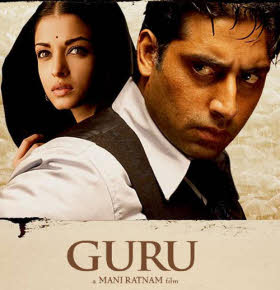by P.R.Viswanathan
[box] P.R.Viswanathan pays a perfect tribute to the roles he has enjoyed and admired in Indian cinema. Watch him pick out characters he loves and rebuild the scenes in front of your eyes. The movies he has chosen span decades and in a way belong to different seasons of cinema![/box]Late one night, I was lazily flipping channels, a daily five-minute routine before retiring for the day, when I chanced upon the last scene of the Mani Ratnam film ‘Guru’. I never tire of that scene. I am totally in agreement with all the arguments advanced by the erring industrialist for producing in excess of his license. Abhishek, being a Bachchan was doing a great job of delivering the dialogue. And yet it was Aishwarya Rai, who stole that scene and I believe every other in which she appeared in that movie. In that scene particularly, everything was in place; her make-up was impeccable. She looked beautiful in a very mature, elderly way – much better than when she won the Miss World contest. The kind of woman that a man would wish to grow old with! The way she looks at her husband is the way that every man would want his wife to look at him – with awe and admiration. At the same time, she conveys a quiet confidence and an impression of tremendous strength. Here is the woman behind the successful man. She could not have founded an industry herself but you begin to wonder if Gurubhai could have done it either without her by his side. Aishwarya simply got under the skin of that role, she looked it and she lived it. Small though it was, it was the role of a lifetime.Wonder if Gurubhai could have done it either without her by his side. Aishwarya simply got under the skin of that role, she looked it and she lived it. Small though it was, it was the role of a lifetime.
That set me thinking of other scenes, other movies and other actors.
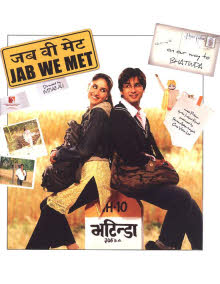 ‘Jab We Met’! Wow! It’s a movie in which everything fell in place. Kareena Kapoor as Geet – innocent, impulsive, bubbly, incorrigibly romantic and alive every moment, Shahid Kapur as Aditya, the scion of a rich industrial family, brooding and melancholic – both played the role of a lifetime. Every bit role was played to perfection like Dara Singh as the ageing patriarch. Pawan Malhotra as the fiery uncle put in his usual, natural, seemingly effortless performance. The music was good; every song seemed to be indispensable to the situation. Of course, our films have two weaknesses and both were on display in Jab We Met – a dragging denouement and showing someone in ridiculous light – in this case, Geet’s earlier beau Anshuman.
‘Jab We Met’! Wow! It’s a movie in which everything fell in place. Kareena Kapoor as Geet – innocent, impulsive, bubbly, incorrigibly romantic and alive every moment, Shahid Kapur as Aditya, the scion of a rich industrial family, brooding and melancholic – both played the role of a lifetime. Every bit role was played to perfection like Dara Singh as the ageing patriarch. Pawan Malhotra as the fiery uncle put in his usual, natural, seemingly effortless performance. The music was good; every song seemed to be indispensable to the situation. Of course, our films have two weaknesses and both were on display in Jab We Met – a dragging denouement and showing someone in ridiculous light – in this case, Geet’s earlier beau Anshuman.
Naseeruddin Shah! God’s gift to the world of cinema! Almost every role he has played qualifies for ‘role of a lifetime’ and yet if we challenge ourselves to choose, there are two that stand out. In both these you will see only the character, not a trace of the actor. In Shyam Benegal’s ‘Mandi’, Dhungrus is Madame Rukmini Bai’s (Shabana Azmi) faithful houseboy, her shadow. He is scrawny and throughout the movie, never walks, always breaks into a run. How the hell did he manage it? We all know Naseer is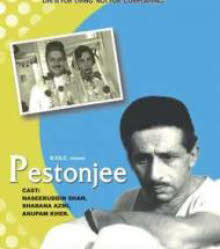 muscular and well-built and has an impressive stride. Mandi is the story of a brothel owner Rukmini Bai lording it over a bevy of girls, who faces possible closure of her business as the result of the machinations of a self-righteous social worker. Dhungrus is not important to the story; he has no role, nothing to say. He is a piece of furniture, cheap furniture at that, a part of the background. No one takes any notice of him including us, the audience. Then, when the credits roll out at the end of the movie and you see the actor’s name, you are whispering to yourself: “Oh God! That was Naseeruddin Shah!”
muscular and well-built and has an impressive stride. Mandi is the story of a brothel owner Rukmini Bai lording it over a bevy of girls, who faces possible closure of her business as the result of the machinations of a self-righteous social worker. Dhungrus is not important to the story; he has no role, nothing to say. He is a piece of furniture, cheap furniture at that, a part of the background. No one takes any notice of him including us, the audience. Then, when the credits roll out at the end of the movie and you see the actor’s name, you are whispering to yourself: “Oh God! That was Naseeruddin Shah!”
And later, you find yourself thinking of him, whenever there is occasion to recall the movie.
Then there was ‘Pestonjee’ by Vijaya Mehta, a story based on life in the Parsi community. Invariably, in such roles, one can expect a large element of caricature. In fact, Naseer’s well-known co-stars in this movie – Shabana Azmi and Anupam Kher – were themselves guilty on that score. But Naseer! His identity simply dissolved and he became a Parsi. Any Mumbaikar who has Parsee friends will vouch for that. The closest in terms of effective portrayal of a particular community was Konkona Sen as a Tamilian in ‘Mr. and Mrs. Iyer’. She looked and spoke like one – again with no element of caricature. She was so good that one feels she must have spent considerable time in Tamil Nadu.
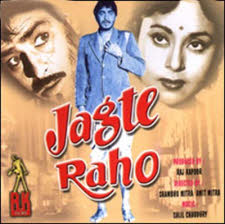 Going back in time, we had ‘Jagte Raho’ in 1956, the story of one night. The hero, if you can call him that is in search of water – just enough to quench his thirst. He enters a huge building and as soon as he bends down to drink water from a dripping tap, there are shrill cries of “chor chor”. Thereafter, all night, he is chased relentlessly from one house to the other; in each house, he finds some nocturnal, nefarious activity in progress. The chase ends only at dawn and our hero at long last gets to drink water. A very different theme and, but for two silly song and dance sequences, it was a near-perfect movie. Raj Kapoor had totally shed his glamour; he became, par excellence, the poor villager lost in the teeming metropolis Kolkata
Going back in time, we had ‘Jagte Raho’ in 1956, the story of one night. The hero, if you can call him that is in search of water – just enough to quench his thirst. He enters a huge building and as soon as he bends down to drink water from a dripping tap, there are shrill cries of “chor chor”. Thereafter, all night, he is chased relentlessly from one house to the other; in each house, he finds some nocturnal, nefarious activity in progress. The chase ends only at dawn and our hero at long last gets to drink water. A very different theme and, but for two silly song and dance sequences, it was a near-perfect movie. Raj Kapoor had totally shed his glamour; he became, par excellence, the poor villager lost in the teeming metropolis Kolkata
(then Calcutta), in search of water, with perpetually folded hands, bewildered by every sight that comes his way. He appears in virtually every scene but speaks only twice. The second time, he holds little Daisy Irani’s hand and weeps: “Main Chor Nahi Hoon (I am not a thief).” Try and go through that scene without weeping yourself.
For us, the fifties-sixties generation, the sketches in our school history book, of Akbar the Great were, overnight, replaced in 1960 (after we saw Mughul-E-Azam, MEA) by the face of Prithviraj Kapoor. Stories about MEA are legion. It was initially slated to be essentially the story of the Salim-Anarakali romance. But at the dress rehearsal, when Prithviraj strode in, in all the finery, the producer-director K. Asif was so impressed that he ordered the script changed – to enlarge Akbar’s role. Prithviraj had the habit of going every day for a few days, to one of the theaters playing his newly released film – just to gauge audience reaction. In the case of MEA, so the story goes, for the seventh day running, during interval, he observed one particular individual. He always had his eyes shut. Prithviraj felt intrigued and possibly, somewhat slighted.
He went up to the man and enquired and this is the reply he got: “Saab! Main Andhaa Hoon! Bas, Prithviraj Ka dialogue Sunne Ke Liye Roz Aata Hoon” (Sir! I am blind. I come here every day only to listen to the dialogues of Prithviraj Kapoor.) The massive, lumbering thespian reportedly broke down.
Akbar was essentially a fighter, a man on whom responsibility was thrust at a young age and then he was a great one for religious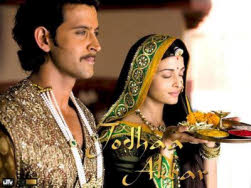 tolerance, justice and encouragement of scholarship and the arts. Back in 1977, when I visited Fatehpur Sikri, this image of Akbar suffered a brief jolt, when my polished Urdu speaking guide showed us a particular part of the palace, which, he said, was used by Akbar to play hide and seek with his queens/consorts. I was incredulous and asked in my crude Bambaiyya (sorry, Mumbaiyya) Hindi: “Akbar Khelta Tha?” (Did Akbar actually play?). My guide gave me a withering look and declaimed in the most dignified manner possible: “Haan! Badshah Bhi Kabhi Kabhi Shaamil Hote Thhey” (Yes! His Majesty too would participate once in a while.”). That served to restore the King’s image in my mind. Then came along ‘Jodhaa Akbar’ in 2008.
tolerance, justice and encouragement of scholarship and the arts. Back in 1977, when I visited Fatehpur Sikri, this image of Akbar suffered a brief jolt, when my polished Urdu speaking guide showed us a particular part of the palace, which, he said, was used by Akbar to play hide and seek with his queens/consorts. I was incredulous and asked in my crude Bambaiyya (sorry, Mumbaiyya) Hindi: “Akbar Khelta Tha?” (Did Akbar actually play?). My guide gave me a withering look and declaimed in the most dignified manner possible: “Haan! Badshah Bhi Kabhi Kabhi Shaamil Hote Thhey” (Yes! His Majesty too would participate once in a while.”). That served to restore the King’s image in my mind. Then came along ‘Jodhaa Akbar’ in 2008.
Somehow, one never imagines Akbar as young; so how could we associate him with love, romance? But Hrithik Roshan played the part to perfection. Akbar had become deeply enamoured of the Rajput princess and sets about to win her heart as ardently and earnestly as the boy next door. The much touted on-screen chemistry between Hrithik and Aishwarya Rai was very much in evidence. And yet the inner toughness of Akbar, his dignity did not suffer one bit. That is Hrithik Roshan’s singular achievement. Certainly he will not replace Prithviraj Kapoor in our imagination but he has added a new dimension to Akbar’s persona. Today, when we think of Akbar, the images of Hrithik and Prithviraj morph into each other in our minds.
Pankaj Kapur! Another Naseeruddin Shah, excelling in a variety of wide-ranging roles! His role in Roja was memorable. How could the ridiculously funny Karamachand of TV turn into the implacable Kashmiri fanatic? And yet the fanatic has a heart? In every frame that he appeared, Pankaj Kapur dominated. His response to Rishi’s (Arvind Swami) question whether he will kill his own mother if ordered to do so – a fanatical nodding of the head and just one word in Tamil (“I will do so”) and his sad eyes with unshed tears, when Rishi condoles him on his brother’s death, who else could have done those scenes?
And then there is Maqbool! I remember the revulsion I felt at the sight of the lecherous don approaching the beautiful Tabu. Once again, one is left wondering – how does he manage it?
Indian Cinema has a profusion of such great acting talent. We have Amitabh Bachchan, Anupam Kher, Aamir Khan, Om Puri, Meena Kumari, Waheeda Rehman, Rekha, Tabu and many others. And let us not forget that behind every successful film role is a great director and script writer. May their tribe increase!
[facebook]share[/facebook] [retweet]tweet[/retweet]
